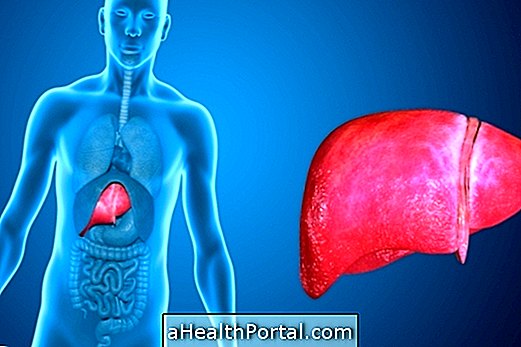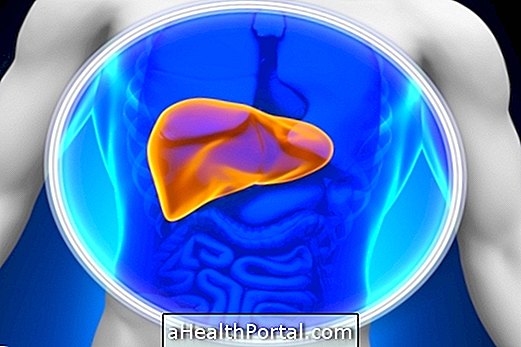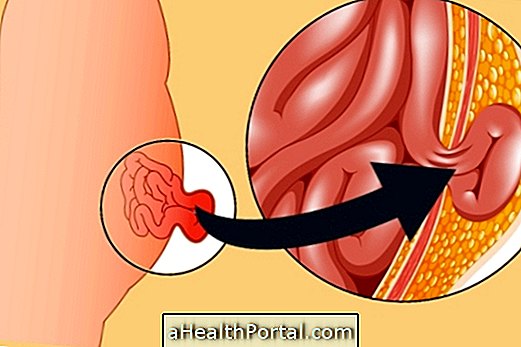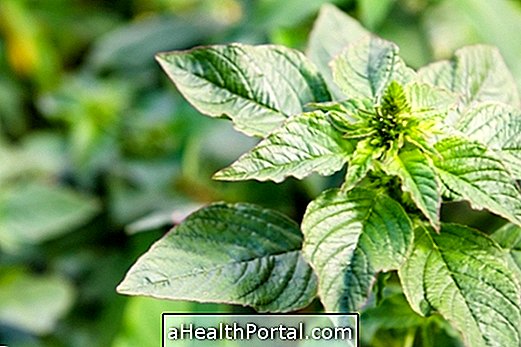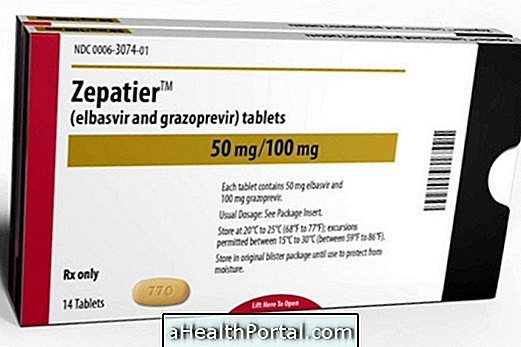Diarrhea with blood is usually caused by an infection in the intestine caused by harmful bacteria. But it is not always necessary to take antibiotics to control this symptom.
The complications that can arise from bloody diarrhea are dehydration and sepsis, which is when harmful bacteria enter the bloodstream and spread throughout the body, causing serious health problems.
So, whenever there is blood-borne diarrhea you should go to the doctor as soon as possible so he can ask for tests to find out which bacteria are causing the change and which antibiotic is most suitable.
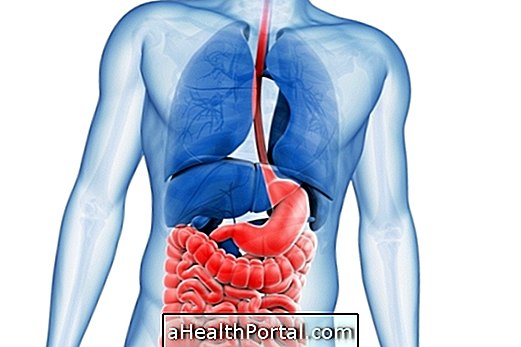
Common Causes of Blood Diarrhea
The scientific name for bloody diarrhea is dysentery and its main causes are:
1. Rotavirus infection:
Rotavirus gastroenteritis is the most common cause of bloody diarrhea in infants and children under 5 years of age.
Symptoms include liquid or soft bowel movements more than 4 times a day, which may contain too much or too little blood, mixed with a pus-like discharge or phlegm, which is a mucus. The child may say that he has a stomach ache and still has fever and vomiting. Recognize the Symptoms of Rotavirus Infection
- What to do: You should take the child to the doctor as soon as possible, and if possible bring a dirty diaper or take pictures of the stool so the doctor can evaluate the color and amount of blood that may be there. Rotavirus infection can cause severe diarrhea and very bad odor, and lasts up to 14 days. During this period the baby or child should be fed with soups, puree and lean meats, but it is very important to provide water, homemade whey or coconut water always after an episode of diarrhea to avoid dehydration.
2. E. coli infection:
Gastroenteritis caused by E. coli is one of the most common causes of diarrhea in adults, causing severe abdominal pain. E. coli is a bacterium present in the gut that is usually not harmful, but certain types of this bacteria can be more harmful causing severe diarrhea. Consumption of water or contaminated food is the main form of contamination. Check the symptoms and how is the diagnosis of E. coli infection
- What to do: Repopulating the gut with the right bacteria is one of the best strategies to stop diarrhea faster. To do this, simply consume probiotic foods or supplements that favor a healthy intestinal flora.
3. Shigella Infection:
Another common cause of diarrhea with blood and mucus in adults is the presence of the Shigella bacteria in the intestine due to food or contaminated water consumption, and symptoms last for 5 to 7 days. Children who are contaminated with this bacterium may still have seizures that cease when treatment is started.
- What to do: You should not take medicines to stop diarrhea because they may make the symptoms worse. This bacteria is often resistant to antibiotics and so if your doctor thinks you need to take antibiotics, it is safer to take a specific test to know what to take so as not to increase the risk of bacterial resistance. Drinking plenty of fluids and consuming easily digestible foods is one of the ways home treatment is always indicated.

4. Ulcerative colitis:
In case of ulcerative colitis it is common to have diarrhea with blood, fever and intense abdominal colic. It is not yet known the cause of this disease and it can occur at any age and is characterized by the presence of several small wounds in the intestinal wall that cause periods of crisis and remission of symptoms throughout life. The tests that can confirm this disease are opaque enema, colonoscopy, and computed tomography.
- What to do: Treatment can be done with remedies to stop diarrhea, dietary supplements, but sometimes it may be necessary to perform surgery to remove part of the intestine. Learn more options for the treatment of ulcerative colitis.
5. Crohn's disease:
Crohn's disease is a chronic inflammation of the intestine that causes diarrhea with blood-intense abdominal pain especially after eating. Check out all the symptoms and how the diagnosis of Crhon's disease is made.
- What to do: A nutritionist can tell you how to feed yourself to live better with the disease, preventing blood-borne diarrhea from becoming frequent. The gastroenterologist may indicate surgery to remove part of the intestine when the disease is very serious and greatly impairs the quality of life of the person.
6. Intestinal worms:
The presence of many worms in the gut can cause diarrhea with blood in children or adults. This is more common in areas with poor hygiene and basic sanitation, which leads people to walk barefoot and eat dirty hands and eat contaminated food.
- What to do: A swollen, sore belly, lack of appetite, and bloody diarrhea may indicate the presence of intestinal parasites. In case of suspicion the doctor may request stool tests to investigate the presence of such parasites. In that case you just have to take medicine for worms to be eliminated quickly. After that you need to take care of the normal bacterial flora of the intestine consuming probiotics, but it is also important to guide the person about the need to take care of their personal hygiene.
7. Side effect of medicines:
Taking the wrong antibiotic may also worsen common diarrhea, switching to bloody diarrhea. This can happen when the person has acute diarrhea and takes an antibiotic on his own, without consulting the doctor, which favors the proliferation of harmful bacteria.
- What to do: Stop taking the antibiotic without medical knowledge. If your doctor prescribes the medicine, you should go back to the doctor's office to see which antibiotic you should take. Check out 5 ways to fight diarrhea caused by the antibiotic
8. Bowel cancer:
Diarrhea with blood that is not being caused by any of the above-mentioned changes may indicate the presence of a tumor in the gut or very close to it in the abdominal cavity. To make sure that it is a cancer that is causing the presence of blood in the stool can be ordered various exams such as stool examination and colonoscopy.
- What to do: Get medical help as soon as possible to find out where the tumor is and which treatment is most appropriate: radiation therapy, chemotherapy, or surgery. Stool transplantation can also be indicated in some situations. Learn all the symptoms of bowel cancer.
Other causes
Other serious causes of bloody diarrhea include intestinal obstruction, poisoning, or severe abdominal trauma, requiring immediate medical attention because diarrhea begins suddenly, being very severe and severe.
Radiation therapy can also cause bloody diarrhea, a side effect of radiotherapy in the abdominal region. In this case the doctor should be advised that you are presenting this symptom to indicate what you need to do. Usually it indicates the use of supplements to replenish normal bacterial flora and remedies to stop diarrhea.
When to go to the doctor
Blood diarrhea is not always a serious change, especially when it comes to an isolated episode, or when it happens in the person who has hemorrhoids but who has had a period of constipation. However, it is recommended to seek medical help if you have diarrhea with blood:
- More than 3 times on the same day or the same week;
- In case of fever above 38.5 ° C;
- If it is accompanied by vomiting with blood or very dark;
- If you have severe stomach pain;
- In case of severe abdominal pain;
- Fainting;
- If you have trouble breathing;
- If you have chills;
- If you have a hard abdomen, it is not possible to press;
- You have immune system weakened by AIDS or cancer.
One should go to the doctor because diarrhea can cause complications like dehydration, which is a serious alteration; iron deficiency anemia; kidney change or sepsis, which is very serious and can lead to death.
